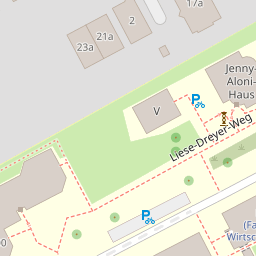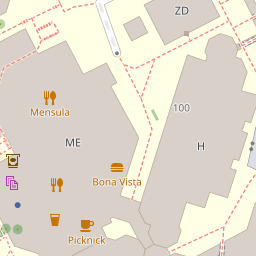Research profile of Paderborn Business Education
At the Department of Business Education, we conduct research into forward-looking vocational education and training. On the one hand, this includes addressing challenges in the existing structures of the vocational education and training system, such as the individual support of vocational learners and skills development in the context of digitalised work and business processes. On the other hand, we are concerned with the innovation of vocational education and training, for example through the increasing integration of vocational and academic education and training or the promotion of entrepreneurial skills. We are characterised by a shared commitment to design-oriented research - in addition to developing theory, the results of our research always contribute to solving concrete practical problems.
Design-orientated vocational training research
"So, what do you do for a living?" - People identify themselves through their work. The decision in favour of a profession influences their entire life. Megatrends such as globalisation, internationalisation, migration and digitalisation are shaping the modern world of work and changing job profiles in the long term. How can good qualifications for professional activities be achieved under these circumstances? The research area of design-oriented VET research addresses this question on three levels: the individual, the organisational and the institutional level.
Individual& organisational skills development
The aforementioned megatrends pose socio-cultural, socio-technical and economic challenges for employees and employers. For example, companies are asking themselves the following questions: What skills do my employees need to keep pace with digitalisation? Or: How can I promote collaborative learning in a multicultural team? Employees, on the other hand, are confronted with questions of career guidance or personal development. The challenges posed by these issues can be addressed through vocational education and training. The research area is therefore dedicated to the didactic design of teaching and learning processes in different life contexts, learning with new media or the measurement and development of competences. The aim is to develop concrete recommendations for action and to consciously shape the transformation processes resulting from megatrends for organisations and individuals and to enable lifelong learning.
Institutional education management
Of course, responsibility for good vocational training and personnel development does not lie solely with companies and individuals. The federal and state governments must ask themselves how they want to make initial and continuing education and training fit for the future and how they can guarantee a high quality of teaching and learning in educational institutions. The key questions in this context are: How can regional educational processes be sponsored? How can we create equal opportunities for all? And what can curricula for sustainable education look like? The design and establishment of institutional foundations for vocational education and training as well as the introduction of education policy programmes and comparisons with global education systems are therefore another important component of design-oriented vocational education and training research. In recent years, Paderborn Vocational and Business Education has established itself as one of the leading national and international research institutions for questions relating to design-oriented VET research and plays a key role in the development of curricula, continuing education programmes and competence frameworks. The Centre for Vocational Education and Training (cevet), which has national and international research collaborations (Oxford, Cambridge, Tonji, Stanford), serves as an interdisciplinary centre of development. As part of a co-operation with the Federal Institute for Vocational Education and Training (BiBB), ministries and a large number of institutes and companies, the Paderborn location will become an even more central player in the research landscape for vocational education and training research in the future.
Research specialisations of the professorships
"Business education research often has evaluative characteristics and is usually to be thought of in terms of evaluation research. It focuses on one or more levels of the VET system and analyses aspects, processes and interrelationships at the micro, meso and/or macro level as well as the interplay between these levels. Learning theory approaches form the basis of the analyses, which can be of a didactic, organisational or structural nature, for example. The focus is on news topics such as new media, e-learning and serious games as well as educational and organisational work, vocational orientation and the challenges in the field of transitions in the vocational education and training system or transitions from the vocational education and training system to the world of work."
Prof Dr Marc Beutner
The strategic co-operation with the Federal Institute for Vocational Education and Training (BIBB) in Bonn is a clear mutual intensification of our relationships in the field of vocational education and training research. Paderborn's business education experts play a leading role, particularly in the field of design-oriented work in vocational education and training practice, which provides an excellent complement to BIBB's topics. Further synergies can be found in the establishment of research groups and a joint international research network.
Prof Dr Hubert Ertl
to the Professorship for Vocational Education and Training Research
"Business education is ideally suited to comprehensively analysing learning and teaching at universities: On the one hand, it addresses the micro-level of teaching and learning processes with the pedagogical-didactic perspective. On the other hand, models of curriculum research help to understand and design the meso-level of higher education, e.g. study programmes and modules. Finally, organisational theory concepts make it possible to take a differentiated look at the framework conditions of educational processes at universities. In addition to the institutional characteristics of higher education institutions, this naturally also includes the connection systems and the transitions into and out of higher education institutions."
Prof. Dr Tobias Jenert
Professorship of Business Education, in particular Higher Education Didactics and Development
"Business education research is characterised by the fact that it focuses on the design of business education fields of action by integrating them into development and innovation contexts and that this approach provides a basis for understanding them. I understand research and development arenas as temporary forms of exchange and interaction for modelling socially relevant problems. In terms of research methodology, it will be interesting in future to anchor design aspects in the context of business education research programmes."
Prof Dr H.-Hugo Kremer
Professor of Business Education, in particular Media Didactics & Continuing Education
"Business education research is a form of social research. It aims at the systematic and comprehensible reflection of pedagogical questions and problems in the vocationally structured employment system. This research is experimental because it is carried out in social fields (social arenas), which should lead to improved knowledge about the design of teaching/learning processes, the organisation and management of educational organisations and the control of the vocational education system."
Prof Dr Peter F. E. Sloane
Profile area "Transformation and education"
Design-oriented vocational education research is part of the "Transformation and Education" profile area at Paderborn University. This brings together the previous research and development work of the Department of Business Education and Vocational Education in the Faculty of Arts and Humanities on vocational education research. In addition to the cooperation with the BiBB, the profile area includes the Business Education Research Training Group, a graduate and early career centre and a methods centre for design-based research.
Research activities
Researchers
The Department of Business Education comprises almost 60 people at all levels of the academic career. As a team, our goal is to shape the future through education.
Get in touch with us!
Prof. Dr. Tobias Jenert
Wirtschaftspädagogik
Warburger Str. 100
33098 Paderborn
Study counselling
You are welcome to contact us if you have any questions about the course content, the individual adaptation of the study programme and the examination regulations for the degree programmes in Business Education. We will also assist you with the recognition of previous achievements and support you with the placement in a higher semester.
















